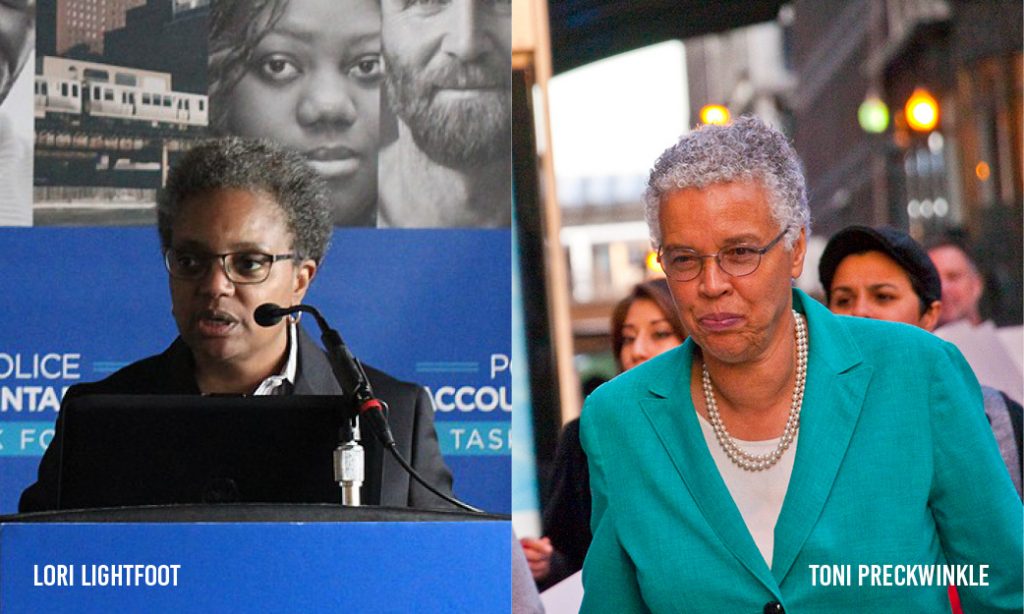
(left) by Daniel X. O’Neil from USA – Chicago Police Accountability Task Force Press Event for the Release of its Report (right) by Charles Edward Miller from Chicago, United States [CC BY-SA 2.0]
For the city’s business community, particularly in real estate, the first election’s results may have prompted some emergency strategy meetings the next morning. Chicago voters roundly rejected most of the candidates with any whiff of “the establishment” about them, such as Bill Daley, Paul Vallas and Susana Mendoza. In Lightfoot and Preckwinkle, voters instead chose two candidates who proudly tout their progressive ideals. Equally concerning to pro-development interests was the election of several aldermen to Chicago City Council who ran on explicitly anti-establishment platforms, with several more also advancing to runoffs against veteran incumbents.
While nothing about city hall’s direction on policy will be certain, even after the results of the April 2 runoff are known, groups including the Chicago Association of Realtors are already mapping out plans for working in a notably different political environment. Still, according to Brian Bernardoni, CAR’s senior director of government affairs and public policy, there’s no doubt that the potential for positive change is still real.
“[Outgoing Mayor Rahm] Emanuel has brought a building boom to the city center. How the next mayor starts compelling development west of Western and south of Roosevelt is the next question,” Bernardoni told Chicago Agent magazine. “It’s got to happen on the West Side, in South Shore, in Auburn Gresham.”
In the eight years since Emanuel took office, Chicago’s skyline has become more crowded and its biggest businesses wealthier. But how to expand that success to a wider swath of Chicago has been a central point of this year’s local elections. Despite the surface-level image of a thriving metropolis, the city faces major economic challenges on several fronts. Chicago’s population continues to decline on an annual basis, led by an exodus of residents from its most blighted neighborhoods. For a city of its size, Chicago’s economy stands out in a number of unfortunate indicators: The unemployment rate is higher and job growth is lower here than the national average. Chicago’s housing market still hasn’t regained the value it lost in the most recent recession, and some developers are reluctant to build outside of a small number of high-demand areas.
“As this campaign unfolds, both candidates are going to need to make an argument to the business and real estate communities on how they are going to address these problems, beyond platitudes,” Bernardoni said.
Both Lightfoot’s and Preckwinkle’s platforms focus on promoting affordable housing development through tax breaks and other reforms. They also each agree, generally, that measures to revitalize struggling neighborhoods through targeted development initiatives and small business support are key to solving Chicago’s economic challenges. Streamlining the zoning and building processes is also a component of both platforms. So what’s not to love in either candidate from the real estate industry’s perspective?
“Clearly, rent control is an important issue for us,” Bernardoni said, referring to CAR’s opposition to recent proposals to repeal the statewide ban on rent control policies, which would open the door to rent restrictions in Chicago. Of the two remaining candidates, only Preckwinkle has specifically voiced support for lifting the rent control ban, saying in a statement that she believed the option to restrict rents “should be given back to local municipalities so they can decide how rent control would best work for them.” At CAR’s Jan. 28 mayoral candidate forum, though, Preckwinkle was reluctant to discuss the issue, saying “I don’t think rent control is the issue we need to be focused on right now.”
Lightfoot has been even less vocal on rent control, consistently dodging requests for her position and instead highlighting her plans for affordable housing. The movement to lift the ban has gained momentum in Chicago and is likely to continue dogging Realtors and their public policy initiatives.
“Preckwinkle’s support of lifting the ban is a concern to us,” Bernardoni said. “We believe that while we’re fighting this in Springfield right now, a pathway to rent control as documented and the pitfalls that can result are of great concern.”
The implementation of the new mayor’s housing initiatives will be almost as important as the high-level plans themselves. Affordable housing has few detractors, even among the development community, but making those projects financially viable is another issue, Bernardoni explained.
“Our concern has historically been that at the end of the day, it has to pencil out,” he said.
Increasing the real estate transfer tax to pay for those and other initiatives is one mechanism that both candidates support, and that CAR opposes. But Bernardoni said his organization sees room to work with both candidates on other policies that might mitigate the ill effects of a higher transfer tax. For example, both Lightfoot and Preckwinkle have expressed interest in reforming city building codes to improve affordability and allow for higher density. They each also have campaigned heavily on changing or ending the longstanding city council practice of aldermanic prerogative, which some argue would streamline zoning and approvals for builders.
“We won’t have an affordable city unless we have an affordable building code,” Bernardoni said. “We are excited that both candidates are interested in some form of property tax reform and making the building code more affordable.”
The litany of items on the next mayor’s housing policy agenda, not to mention other intractable problems facing Chicago in the years ahead, makes it difficult to chart a path forward. Ultimately, the local real estate community will need to do all it can to maintain a sense of focus.
“There needs to be a pro-development environment that starts in the mayor’s office and works its way through the community,” Bernardoni said.
YES! I hope the next mayor of Chicago addresses our draconian zoning laws.